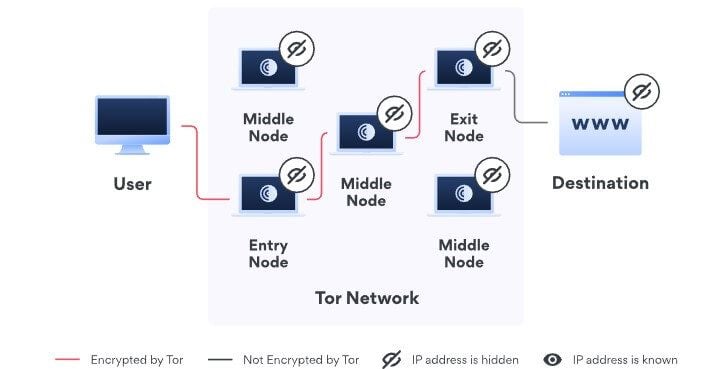Featured
Table of Contents
What's The Difference Between Vpn And Tor?
In practice, Tor Browser is free, while VPNs are typically paid, which makes your option easy? Today, I desire to offer you a full contrast of Tor vs VPN and explain what they represent, their differences, use cases, and much more.
To begin this Tor vs VPN comparison, I first require to discuss what these tools represent. Giving you a clear meaning of what they are and how they work will help you comprehend their differences, so pay close attention. Beginning with Tor, this term is an abbreviation for "The Onion Router".
Nord, VPN It's crucial to remember that this is a tool for anonymity and not privacy I'll explain why soon. When it comes to Tor nodes, they're held and kept by volunteers, so we're speaking about a decentralized service, instead of a central service which is the case with a VPN.
The good side is anonymity since nodes aren't run by any particular business, so you aren't risking saving and logging your surfing activity by that company. On the other hand, the security of each node depends on the person that's keeping it. As such, a node can be compromised by a hacker, let's say, who will be able to trace your connection.
Difference Between Tor And Vpn
The entry node is more important because, when linking to Tor, your ISP can see that you did that through the entry node. We'll talk about that later on in this Tor vs VPN short article.

Its "The Onion Router" name originates from the truth that it peels the layers of encryption similarly to the onion layers. And dark web sites likewise have the domain ". onion", which isn't a coincidence. Listed below, I discussed how Tor works and the procedure of encrypting and decrypting your demands.
When you link to the Tor network and you send a request, you get triple file encryption for each node. There's the entry node (typically called the guard node), the middle node (or middle server), and the exit node. Tor sends your demand to the entry node, which gets rid of the first layer of file encryption.
Nevertheless, the entry node can't read the encrypted content of the request, so it still can't trace your activities inside the Tor network. The traffic is then sent to the middle node, which removes another layer of encryption and sends out the encrypted traffic to the exit node. Finally, the exit node peels the final layer of file encryption, which is why it can see the encrypted demand but it can't determine who is sending it since it can't see your IP address.
Tor Vs Vpn: Which Is Better?

If you're aiming to remain anonymous online and you're thinking of using Tor, I believe it's good to understand more about its benefits and disadvantages, so check them out listed below. The triple layer of file encryption guarantees 100% anonymity when using Tor Web browser It's totally free and does not need any subscriptions It's a decentralized, open-source network with no monitoring and surveillance Tor Web browser is capable of going on the dark web The entry node can read your IP address and make it visible to your ISP when utilizing Tor Decreases your internet speed considerably due to advanced file encryption Nodes are operated by volunteers who might not do an excellent job at ensuring they're safe and secure You can't pick an IP address from a specific country, so you can't bypass geo-blocks Tor Browser doesn't work on all platforms Wondering what are the differences between Tor and VPN? Well, for the start, a VPN is a tool for personal privacy, which implies it'll conceal your identity and avoid anyone from seeing who you are.
VPN services offer thousands of servers in various nations, so they permit you to link to any of them quickly and get an IP from the country you need. Then, each request you send out is routed through a VPN tunnel where it is sent out to a VPN server which decrypts it and connects you to the website you desire.
g. the site you're going to The exact same process applies to traffic coming from the network from your gadget. It's vital to discuss that a while Tor (Tor Web browser) is focused on the part of the connection in Tor Internet browser. This is why a VPN is appropriate for torrenting, for example, while Tor encrypts just the part of the connection sent out through the Tor Web browser.

With a single layer of encryption, the VPN in fact goes through fewer actions to protect your connection which has a big advantage much quicker speeds and much better performance. They're really simple to utilize VPNs can be set up on every platform (Windows, i, OS, Linux, Android, mac, OS, routers,) You can choose an IP address from a specific country, letting you bypass geo-restrictions There's a greater degree of accountability since you know who owns the VPN servers VPNs are very fast and superior companies use 10 Gbps servers Advanced security features like a kill switch, ad blocker, and Multi, Hop Total personal privacy, thanks to innovative file encryption and the capability to hide your initial IP It's a paid service which can be a problem for budget-constricted users Some VPN services are understood for storing logs (Hola VPN, Ninja, VPN, Betternet,) You must select a reliable VPN that has a no-logs policy considering that you're handing over your privacy/anonymity to that company Now that you what Tor and VPN are, I feel the requirement to rapidly summarize their distinctions just to make sure you understand whatever well.
Latest Posts
10 Best Business Vpn Services [2023]: A Comprehensive ...
Best Virtual Private Networks Reviews 2023
Best Vpns For Android - All About Cookies